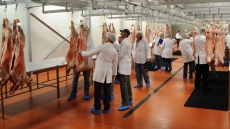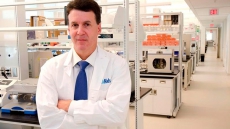TORONTO — The number of babies born with symptoms of opioid withdrawal because of their mother's use of the medications has jumped 15-fold in Ontario over the last two decades, reflecting increased prescribing of the potent and addictive pain killers, researchers say.
Most of those babies were born to women who were prescribed an opioid such as codeine, oxycodone or morphine by their doctors, both before and during pregnancy, says the study published Wednesday in the journal CMAJ Open.
Researchers found that the rates of newborn withdrawal — called neonatal abstinence syndrome — in Ontario grew from about 0.3 per 1,000 live births in 1992 to 4.3 per 1,000 in 2011.
"That's a big increase," said principal researcher Dr. Suzanne Turner, a family physician at St. Michael's Hospital in Toronto who specializes in providing obstetrical care for women with addictions.
Over the 20-year period, data showed there were almost 3,100 infants born in the province suffering symptoms of neonatal abstinence syndrome, which mimic those in adults going through withdrawal from an opioid.
However, the largest proportion of babies with the syndrome — 1,901, or almost two-thirds — occurred in the last five years of the study, a period when prescribing of opiates like oxycodone for pain was on the rise.
Almost half of the infants were born to women who were eligible for publicly funded prescription drugs at the time of delivery, anonymized prescription records show. The women had been prescribed an opiate at various time periods, ranging from one or two years before delivery to 100 days before delivery.
However, as their due date approached, many of the women were shifted from opioids to methadone, a drug prescribed almost exclusively to people addicted to pain killers. In recent years, addiction to prescription opioids has supplanted heroin addiction as the most common reason to treat someone with methadone.
"So it suggests that women were prescribed opiates to treat pain prior to their pregnancies and at some point an addiction was identified and they were switched to methadone," said Turner.
"That's really important because we know that methadone is actually good in pregnancy because it stabilizes mom, and babies are more likely to be born at term and at high birth weight and healthy," she said.
"But the concern to me is how do we address the fact that they were prescribed opiates prior to pregnancy and is there something we can do at that stage to prevent the transition to addiction and then requiring methadone."
Infants experiencing post-natal withdrawal are often irritable, cry more, and can have vomiting and diarrhea, all of which can affect weight gain and put them at risk for seizures if the condition is not identified.
"This is a treatable condition. If the babies get morphine, which is typically the standard of care ... they're not in withdrawal and then we slowly wean (them off) that dose of morphine over time."
Still, having a newborn in the nursery or in the neonatal intensive care unit for two or three weeks can be stressful for families, Turner said, suggesting that preventing addiction by using alternative pain-relief therapies when possible would pay dividends for both mothers and their babies.
"It speaks to the fact that doctors need to be aware there is the risk of addiction if women are prescribed opiates prior to pregnancy, and if they're of child-bearing age, those risks should be assessed."
As well, women should be counselled that the use of any opioid during pregnancy can cause neonatal withdrawal, especially since unplanned pregnancies are common among women with addictions, she said.





